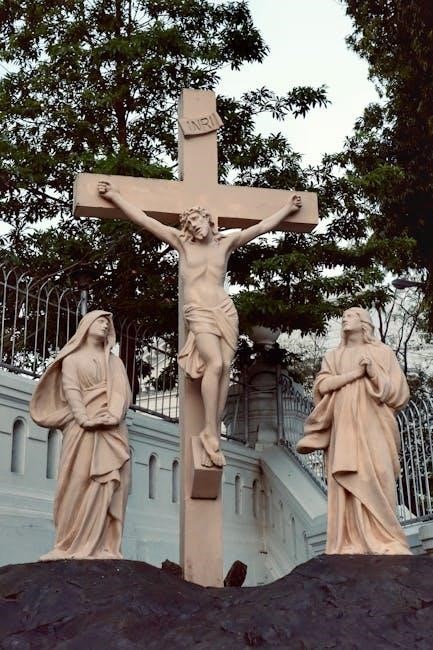The book Jesus and John Wayne by Kristin Kobes Du Mez explores the intertwining of American evangelicalism and cultural notions of masculinity. It critiques how white evangelicalism has shifted from the teachings of Jesus to embrace a militant‚ nationalist ideology‚ influencing both religion and politics in the U.S.
1.1 Overview of the Book
Jesus and John Wayne by Kristin Kobes Du Mez is a historical analysis of white evangelicalism in the U.S.‚ exploring its cultural and political evolution. The book examines how evangelicals embraced a militant‚ nationalist ideology‚ blending faith with masculinity‚ and critiques the shift from Jesus’ teachings to a warrior-like figure. It offers a critical perspective on the faith’s role in societal divisions and political influence.
1.2 Author Background: Kristin Kobes Du Mez
Kristin Kobes Du Mez is a historian and author known for her work on American evangelicalism. She earned her Ph;D. in history and has written extensively on religion‚ gender‚ and culture. Her book Jesus and John Wayne reflects her expertise in exploring the intersection of faith and politics‚ offering a critical perspective on evangelical identity and its societal impact.
1.3 Key Themes and Objectives
Jesus and John Wayne examines the fusion of white evangelicalism with American masculinity and nationalism. It critiques how evangelical culture has shifted from Jesus’ teachings to embrace a warrior-like figure‚ influencing political alignment and societal division. The book aims to uncover the historical roots of this transformation and its implications for faith and national identity.
Historical Context of White Evangelicalism in the U.S.
The book traces the transformation of white evangelicalism over 75 years‚ highlighting its cultural and political evolution‚ influenced by figures like John Wayne and nationalist ideals.
2.1 The Rise of White Evangelicalism
White evangelicalism emerged as a dominant force in U.S. culture‚ blending religious identity with American nationalism. This rise was fueled by influential leaders‚ media‚ and political movements‚ shaping a distinct ideology that emphasized moral authority and cultural dominance‚ often aligning with conservative values and militaristic ideals‚ as explored in Jesus and John Wayne.
2.2 The Intersection of Religion and Politics
The book highlights how white evangelicalism deeply intertwined with political ideologies‚ particularly conservatism. Evangelicals’ religious beliefs influenced their support for leaders like Trump‚ blending faith with nationalism. This intersection‚ as explored in Jesus and John Wayne‚ reflects a cultural shift where religious identity became a powerful political force‚ shaping policies and societal divisions in the U.S.

The Figure of John Wayne as a Cultural Icon
John Wayne embodies American masculinity‚ individualism‚ and toughness‚ symbolizing a bygone era of rugged frontier values. His image‚ shaped by media‚ reflects conservative ideals and cultural identity.
3.1 John Wayne’s Symbolism of American Masculinity
John Wayne’s on-screen persona epitomized American masculinity‚ representing strength‚ resilience‚ and a charismatic‚ unyielding individualism. His characters often depicted a rugged‚ self-reliant man who upheld conservative values‚ resonating with audiences as a cultural icon of traditional masculinity and patriotism‚ deeply ingrained in the American psyche.
3.2 The Role of Media in Shaping His Image
John Wayne’s image was meticulously crafted by Hollywood‚ emphasizing his larger-than-life persona through films‚ interviews‚ and public appearances. Media portrayed him as a symbol of American values‚ reinforcing his role as a masculine icon and cultural hero. This curated image‚ amplified by his movie roles‚ solidified his status as an enduring representation of American identity and ideals.
The Portrayal of Jesus in Evangelical Culture
Evangelical culture often portrays Jesus as a blend of divine savior and cultural warrior‚ reflecting a shift towards militant ideals influenced by American icons like John Wayne.
4.1 The Evolution of Jesus’ Image in Evangelical Teachings
The image of Jesus in evangelical teachings has evolved from a compassionate‚ humble figure to a more militant‚ dominant one‚ reflecting cultural shifts. This transformation aligns Jesus with ideals of strength and authority‚ often mirroring American masculinity. The shift has been influenced by cultural icons like John Wayne‚ blending faith with nationalist and patriarchal values‚ reshaping evangelical identity and practices.
4.2 The “Warrior Christ” Narrative
The “Warrior Christ” narrative portrays Jesus as a powerful‚ militant figure‚ emphasizing strength and dominance over compassion. This image aligns with cultural ideals of masculinity and nationalism‚ influencing evangelical support for authoritarian leadership and aggressive politics. The blending of faith and masculinity creates a Christ who embodies both spiritual and physical might‚ reflecting broader societal shifts toward militarism and patriarchal values.

The Blending of Faith and Masculinity
The book examines how white evangelicalism intertwined religious identity with traditional masculine ideals‚ creating a cultural narrative that equates faith with strength‚ authority‚ and nationalism‚ shaping both spiritual and political landscapes.
5.1 Militant Masculinity in Evangelical Ideology
Militant masculinity in evangelical ideology is rooted in the portrayal of Jesus as a warrior figure‚ emphasizing strength‚ dominance‚ and authority. This narrative aligns with cultural ideals of masculinity‚ fostering a worldview where leadership and power are divine mandates. Such ideals have been perpetuated through influential figures and media‚ shaping both religious and political discourse within evangelical communities.
5.2 The Impact of Toxic Masculinity on Religious Practices
Toxic masculinity within evangelicalism has fostered a culture of exclusion and dominance‚ often justifying aggressive behaviors as divine mandates. This ideology has shifted religious practices away from compassion and humility‚ emphasizing authority and control. Such practices have alienated marginalized groups and perpetuated societal divides‚ reflecting a departure from the teachings of Jesus and embracing a warrior-like identity instead.

The Role of Leadership in Shaping Evangelical Identity
Evangelical leaders have profoundly shaped the movement’s identity by promoting ideals of strength‚ authority‚ and cultural dominance‚ aligning faith with political and masculine ideologies‚ as detailed in Jesus and John Wayne.
6.1 Influential Figures in Evangelical History
Key evangelical leaders have shaped the movement’s identity by blending faith with cultural and political ideologies. Figures like Billy Graham and Jerry Falwell emphasized moral authority‚ while others promoted a masculinity tied to nationalism‚ influencing generations to align evangelicalism with conservative values and militant ideals‚ as explored in Jesus and John Wayne.
6.2 The Role of Religious Leaders in Promoting Militant Ideals
Evangelical leaders have often fused religious teachings with militant masculinity‚ promoting a “warrior Christ” narrative. By aligning with political figures and ideologies‚ they’ve encouraged followers to view their faith as under siege‚ justifying aggressive postures in culture and politics‚ as detailed in Jesus and John Wayne.
The Intersection of Religion and Politics
Jesus and John Wayne explores how white evangelicals merged religious identity with political power‚ shaping a cultural narrative that equates faith with nationalism and militarism in America.
7.1 Evangelical Support for Political Leaders
Evangelicals have consistently supported political leaders who embody their values‚ often aligning faith with nationalism. The book highlights how figures like Trump were embraced as defenders of a militant‚ masculine Christianity‚ blending religious identity with political power and reshaping the cultural landscape. This alliance has deeply influenced American politics and societal divisions.
7.2 The Role of Evangelicals in Modern Political Movements
Evangelicals have played a pivotal role in shaping modern political movements‚ advocating for issues like religious liberty and traditional values. Their influence extends beyond elections‚ as they mobilize communities and frame policies through a lens of moral authority. This activism reflects their belief in a divine mandate to reshape America‚ often blending faith with cultural conservatism and nationalism.

The Impact on Society and Culture
The book highlights how white evangelicalism’s shift toward militant ideals has fueled cultural polarization‚ reinforcing divisions in American society and influencing political and social discourse profoundly.
8.1 The Fracturing of American Society
The book reveals how the ideological shift in white evangelicalism has contributed to cultural polarization‚ fostering an “us versus them” mentality that deepens societal fractures. This mindset has exacerbated racial tensions and political divides‚ undermining efforts toward unity and social cohesion‚ while perpetuating harmful stereotypes and divisions across America.
8.2 The Role of Evangelicalism in Racial and Social Divisions
Evangelicalism’s embrace of militant masculinity has perpetuated racial and social divisions by aligning with nationalist ideologies. The book highlights how this alignment has justified systemic racism and exclusion‚ further entrenching disparities. Such ideologies have not only fractured communities but also undermined efforts toward racial reconciliation and social justice‚ reflecting a divergence from the inclusive teachings of Jesus.
The Book’s Reception and Critique
Jesus and John Wayne has sparked significant debate‚ receiving both acclaim and criticism. It has been praised for its incisive analysis of evangelicalism’s cultural and political influence‚ while some critics argue it oversimplifies complex theological issues within the evangelical movement. The book’s provocative arguments have made it a focal point in discussions about religion‚ masculinity‚ and American identity.
9.1 Academic Reviews and Reactions
Scholars have praised Jesus and John Wayne for its insightful analysis of evangelicalism’s cultural and political evolution. Reviewers highlight its exploration of masculinity and nationalism within religious frameworks. However‚ some critics argue the book oversimplifies theological complexities. Despite debates‚ the work has been widely recognized for its contribution to understanding the intersection of religion and American identity‚ sparking significant academic discussion.
9.2 Popular Reception and Controversies
Jesus and John Wayne sparked intense public debate‚ with many praising its critique of evangelicalism’s cultural shifts. However‚ some evangelical leaders criticized the book for misrepresenting their beliefs. The controversy led to increased media attention‚ making it a bestseller. Its discussion of Trump-era evangelical support fueled polarized reactions‚ highlighting its relevance in contemporary religious and political discourse.
The Significance of the Book in Contemporary Debates
Jesus and John Wayne challenges narratives about evangelicalism‚ sparking discussions on faith‚ politics‚ and masculinity. Its critique of cultural shifts fosters dialogue on religion’s role in modern society.
10.1 Contributions to Understanding Evangelicalism
Jesus and John Wayne offers a critical analysis of white evangelicalism‚ tracing its cultural and political evolution. By examining the intertwining of faith‚ masculinity‚ and nationalism‚ the book provides a historical perspective on how evangelical identity has shifted‚ contributing to a deeper understanding of its role in shaping societal divisions and political movements in modern America.
10.2 The Book’s Role in Ongoing Theological and Cultural Discussions
Jesus and John Wayne has become a focal point in theological and cultural debates‚ challenging traditional narratives about evangelicalism. Its provocative analysis of faith‚ masculinity‚ and nationalism sparks critical conversations about religion’s role in politics and identity. By bridging theology and cultural studies‚ the book fosters dialogue on the intersections of faith‚ power‚ and societal divisions‚ making it a significant contribution to contemporary discourse.
Jesus and John Wayne critiques the corruption of faith and societal fracturing caused by white evangelicalism’s embrace of militant masculinity and political power‚ reshaping American religion and culture.
11.1 Summary of Key Arguments
Jesus and John Wayne examines how white evangelicalism in the U.S. has diverged from the teachings of Jesus‚ embracing a militant‚ nationalist ideology tied to cultural masculinity. The book highlights how this shift has influenced political support for figures like Donald Trump and contributed to societal divisions‚ reshaping both faith and national identity.
11.2 The Broader Implications for Faith and Society
The book highlights how the blending of faith and militant masculinity has fractured faith communities and eroded trust in institutions. It underscores the cultural polarization fueled by evangelical ideologies‚ challenging the traditional teachings of Jesus. The broader implications reveal a society divided by race‚ gender‚ and politics‚ with far-reaching consequences for religious and national identity.
References and Further Reading
Academic sources include The Historical Jesus in Context by Allison Jr. and Crossan. The book is available as a PDF and in other formats for deeper exploration.
12.1 Academic Sources and Citations
Scholarly works like The Historical Jesus in Context by Allison Jr. and Crossan‚ and The Destination and Purpose of St John’s Gospel by Robinson‚ provide deeper theological insights. These texts‚ available in PDF and other formats‚ support the analysis of evangelical ideologies and their cultural implications‚ offering a robust foundation for understanding the themes explored in Jesus and John Wayne.
12.2 Recommended Reading for Deeper Understanding
For further exploration‚ readers can delve into works like The Historical Jesus in Context and The Destination and Purpose of St John’s Gospel. These texts‚ available in PDF formats‚ offer complementary perspectives on evangelicalism‚ masculinity‚ and cultural influence‚ enriching the analysis presented in Jesus and John Wayne.

